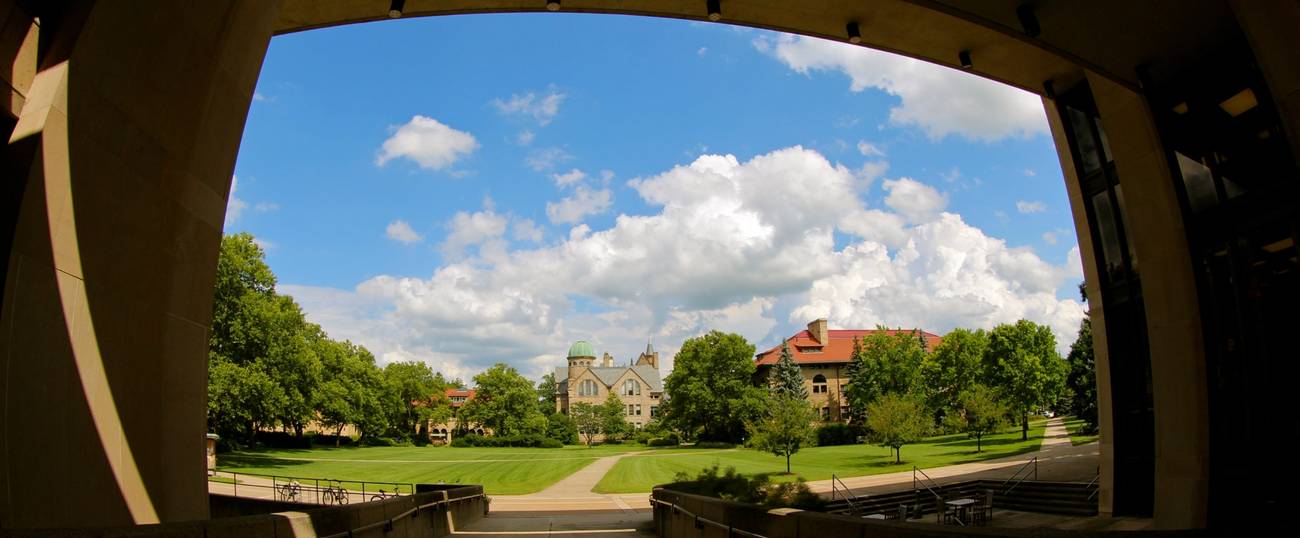Oberlin Fires Anti-Semitic Professor Who Said Jews and Israel Were Behind ISIS and 9/11
But will the college face up to the anti-Semitic climate on campus that the controversy over Joy Karega’s conduct exposed?




Yesterday evening, after a lengthy investigation, Oberlin College officially dismissed Joy Karega, a non-tenured professor and writing instructor who had moonlighted as a purveyor of anti-Semitism online. Among other outlandish exploits, Karega had shared material on Facebook accusing Israel and Jews of being behind ISIS, 9/11, and the Charlie Hebdo attack. She also infamously posted a meme in which Jewish banker Jacob Rothschild is shown proclaiming, “We own your news, the media, your oil, and your government.”
Initially, Oberlin was slow to respond to Karega’s bigotry. When first informed of it by a concerned alumni group back in January 2015, the college’s administration sat on the information until it was exposed by the media a month later. After the story broke, it took an intervention by the school’s board of trustees to jolt the college leadership into confronting Karega’s conduct. Finally, in August 2016, Karega was placed on paid leave, pending an investigation.
That investigation has now concluded with Karega’s dismissal. As the college noted in its letter announcing the move, Karega had been unrepentant and “disclaimed all responsibility for her misconduct.” In fact, as Tablet has reported, the social justice writing instructor continued echoing anti-Semitic content on Facebook even while under investigation.
While it is reassuring that Oberlin’s administration ultimately came to the obvious conclusion regarding Karega, the campus’s general conduct toward anti-Semitism has been less so. To begin with, as Tablet reported, Karega was hired by a small search committee that included two of Oberlin’s associate deans, all of whom failed to recognize her bigotry, despite the fact that they were vetting her to instruct undergraduates in social justice. There appears to have been no inquiry into how this transpired.
Equally troubling is the fact that even after Karega’s bigotry came to light, the school’s Student Senate condemned criticism of her as a “witch hunt.” That the student leadership of a liberal college campus in 2016 would be tougher on those fighting anti-Semitism than on those promoting it is simply shocking, and suggests a basic failure of moral education. This conduct should not be surprising, however, given that Jewish students at Oberlin have told reporters that they are afraid to speak on record about campus anti-Semitism for fear of opprobrium from their peers. There appears to be no effort at Oberlin as yet to address these deeply disturbing developments.
Last May, Tablet’s own reporting found that anti-Semitic assumptions about Jews and conduct towards them at Oberlin dated back decades, long before Karega set foot on campus.
The college’s dismissal of Karega is a good start, then, but the school still has a lot more work to do if it wants to present itself as a safe space for Jews.
Oberlin’s letter on Karega’s dismissal is reproduced in full below:
The Oberlin College Board of Trustees, after extensive consideration and a comprehensive review of recommendations from multiple faculty committees and Oberlin President Marvin Krislov, has voted to dismiss Assistant Professor of Rhetoric and Composition Joy D. Karega for failing to meet the academic standards that Oberlin requires of its faculty and failing to demonstrate intellectual honesty.
The dismissal is effective Tuesday, November 15, 2016.
As a Board, we agree with President Krislov and every faculty committee reviewing this matter that the central issues are Dr. Karega’s professional integrity and fitness. We affirm Oberlin’s historic and ongoing commitment to academic freedom.
During this process, which began with Dr. Karega’s posting of anti-Semitic writings on social media, Dr. Karega received numerous procedural protections: she was represented by counsel; she presented witness testimony, documents, and statements to support her position; and she had the opportunity to cross-examine witnesses testifying against her.
The faculty review process examined whether Dr. Karega had violated the fundamental responsibilities of Oberlin faculty members – namely, adherence to the “Statement of Professional Ethics” of the American Association of University Professors, which requires faculty members to “accept the obligation to exercise critical self-discipline and judgment in using, extending and transmitting knowledge” and to “practice intellectual honesty.”
Contrary to this obligation, Dr. Karega attacked her colleagues when they challenged inconsistencies in her description of the connection between her postings and her scholarship. She disclaimed all responsibility for her misconduct. And she continues to blame Oberlin and its faculty committees for undertaking a shared governance review process.
For these reasons, the faculty review committees and President Krislov agreed on the seriousness of Dr. Karega’s misconduct. Indeed, the majority of the General Faculty Council, the executive body of Oberlin’s faculty, concluded that Dr. Karega’s postings could not be justified as part of her scholarship and had “irreparably impaired (her) ability to perform her duties as a scholar, a teacher, and a member of the community.”
In the face of Dr. Karega’s repeated refusal to acknowledge and remedy her misconduct, her continued presence undermines the mission and values of Oberlin’s academic community. Thus, any sanction short of dismissal is insufficient and the Board of Trustees is compelled to take this most serious action.
Previous: Oberlin Places Anti-Semitic Professor on Leave
How Oberlin Has Repeatedly Failed to Confront its Anti-Semitism Problem
The Real Scandal at Oberlin is Much Bigger Than One Professor’s Anti-Semitism
Yair Rosenberg is a senior writer at Tablet. Subscribe to his newsletter, listen to his music, and follow him on Twitter and Facebook.